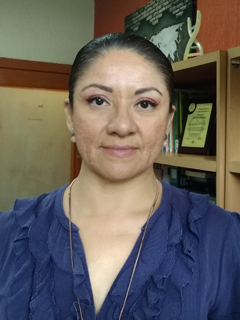 |
Lucila I. Castro-Pastrana
Professor of Chemical and biological Sciences
Universidad de las Américas Puebla (UDLAP)
Dr. Castro-Pastrana is a full-time professor and researcher at the Universidad de las Américas Puebla (UDLAP), México since 2004. She is a certified professional by the Board of Pharmacy of the Colegio Nacional de Químicos Farmacéuticos Biólogos México AC. Recently, she coordinated a dual certificate online program between UDLAP and the University of California, San Diego on "Clinical trials administration in Latin America" (2014-2018). She has also served as the Director of Research and Graduate Studies at UDLAP (2014-2016) and as the UDLAP´s representative on the operational committee of the Puentes Consortium, a US-Mexico binational community of scholars. She is the former President of the Mexican Association of Hospital Pharmacists (2012-2013) and a Member of the Board of Directives and Coordinator of the Continuing Education program of this association (2009-2011).
After completing her Bachelor's of Quimicofarmacobiología (UDLAP, México) and her Doctorate in Pharmaceutical Biochemistry (Eberhard-Karls Universität Tübingen, Germany), she complimented her training through two Post-doctoral Fellowships in Adenylyl Cyclase Biochemistry (University of Durham, United Kingdom) and Pharmacovigilance/Pharmacogenomics (University of British Columbia, Canada). Currently, she collaborates as associate editor for Revista Mexicana de Ciencias Farmacéuticas and as editorial board member for Revista Entorno UDLAP, and as director and editor-in-chief of the electronic divulgation journal on pharmaceutical sciences inFÁRMAte. She previously served as editor and co-author of the first book on pharmacovigilance written in Mexico (“Farmacovigilancia en México: de la teoría a la práctica”; 2010) and of the books “Farmacovigilancia. La seguridad de los medicamentos en el siglo XXI” (2015) and “Retos actuales en farmacovigilancia. Una visión integral de los desafíos de la atención sanitaria” (2017). She is actively engaged in pharmacoepidemiology and in drug and patient safety research projects. Her interest is to seek to promote scientific collaboration between hospitals and hospital pharmacists across Mexico through networking research projects.
|
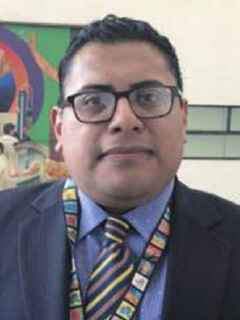 |
Oscar Galindo
Dr. Oscar Galindo is the Director of the Psych-oncology Research and Development Unit at the National Cancer Institute (INCAN) of Mexico. He received his PhD in Psychology from the Universidad Nacional Autónoma de México, and is a Postgraduate Tutor in Psychology. Dr. Galindo is a member of the International Society of Psycho-Oncology and part of the founding and coordinating committee of the Latin American Psychosocial Oncology Research Training Group FIPOL: An initiative to support research collaborations, resource development, scientific communication, and educational opportunities in psychosocial oncology for Latin America. His main research interests consist of clinical care programs in Mexico populations with greater psychosocial adversity, psycho-oncology in patients with hereditary cancer, psychological intervention in patients with breast cancer, informal primary caregivers, and health literacy.
|
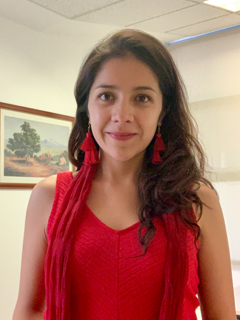 |
Erika Palacios-Rosas
Associate Professor of Health Sciences
Dr. Palacios- Rosas is a full-time professor and researcher at the Universidad de las Américas Puebla, Mexico since 2013. She holds a bachelors in Pharmaceutical Sciences and a PhD in Pharmacology and Physiology from the Universidad Autónoma de Madrid, Spain. Throughout her career she worked as Chief of the Pharmacy Office at the Childrens Hospital of Tlaxcala. Her interests are on carrying out research on patient safety, prescription and rational use of drugs, medication errors, mainly pharmacoepidemiology and pharmacovigilance. She also studies quality of life, level of depression and other physchological and social predictors in patients with chronic diseases. Her current project proposes actions to address the study of the factors that influence the reach of therapeutic goals, including prescription, use of durgs, characteristics of patients and their environment. Frequently, variables such as the level of anxiety, depression, perception of their disease and degree of knowledge, have a considerable influence on the adherence to treatment and on the expected therapeutic outcomes. Therefore, the study aims to evaluate these variables to define intervention protocols to promote patient safety and adherence to their treatments.
|
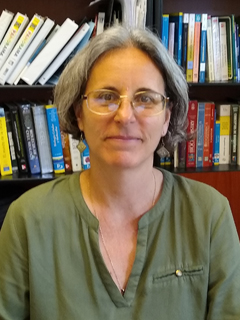 |
Laura Veronica Pla
Associate Professor
Dr. Pla holds a PhD degree in Biological and Medical Engineering from the Henri Poincaré University, Nancy 1, France and a Bachelor degree in Biochemistry. She has worked as Research and Teaching Assistant and was an Official Guest of the Faculty of Biochemical and Pharmaceutical Sciences. Throughout her extensive career she received distinctions such as the Argentine Society of Microcirculation and Hemorehology Award for the experimental work entitled "Evaluation of the erythrocyte agglutination energy mediated by monoclonal antibodies".
From 2002 to 2005, Dr. Pla was a member of the National System of Researchers from Mexico in the category of candidate. She also participated in research projects in collaboration with UNR and Université Henri Poincaré, Nancy 1; published 7 works in collaboration in journals of international level, and attended 20 congresses of biochemistry and biotechnology. She was a former member of the Biology Society of Rosario, Argentina. Some of her current affiliations include; the Mexican Society of Tropical Medicine since 2005 and the Commission of Technologies and Medical Sciences of the Consultative Forum from Puebla (México) for the Innovation and Technological Development since 2006. She is a a full time Professor in the Department of Chemical-Biological Sciences of the School of Sciences at the University of the Americas Puebla, where she organized the first Colloquium in Molecular Biomedicine (2015) and today she is developing a project to promote health habits and environmental care.
The aim of her present project is to analyze the immunological effect of probiotics in mononuclear cells of healthy individuals, in order to contribute to the analysis of the immunological mechanisms that promote said microorganisms to improve health. She is an expert in flow cytometry and immunologic techniques.
|
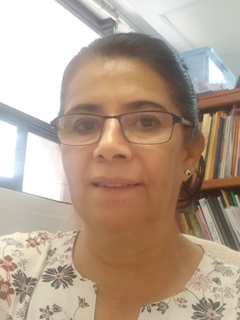 |
Maria Armida Patricia Porras- Loaiza
Associate Professor of the Department of Tourism
Dr. Porras- Loaiza is a full time professor of the tourism department, school of business of the Universidad de las Américas Puebla, she served as head of the laboratories of food and beverage of the career of administration of hotels and restaurants for more than 10 years, she has taught courses and workshops on various national and international universities. She is also a co-author of the book “Effects of Omega 3 Chia on a diet high in oil for frying”, and has collaborated on various chapters, indexed articles and thesis of bachelors and masters where presented at national and international congress.
She obtained first place with the works "Effects of the omega 3 supplementation of chia seed in a murine model fed for a diet in frying oils" and "Composition of Chia cultivated in different regions of Mexico" and honors recognition of the "Evaluation of nutritional status and eating habits in preschool children El Pípila" in the community of San Martin Tlamapa, Sta. Isabel Cholula Puebla. She is a member of the Ethics and Research Committee of the Department of Health Sciences of the UDLAP, the Academic Council of the Mexican Society of Safety and Quality for Consumers of Food A.C., the scientific committee of the National Association for Safety and Quality Alimentaria in Mexico and forms part of the scientific committee of the Liaison Group for the promotion of Amaranth in Mexico.
Dr. Porras received a PhD in Food Science from the Universidad de las Américas Puebla in the 2011, a teacher in Education Sciences in 1999 at the same university and a degree in QFB in Technology from Foods in 1980 of the National Autonomous University of Mexico. She also completed a specialization in nutrition in 1980 at the National Institute of Nutrition Salvador Zubirán, completed two graduates in "Training Program for Science and Technology Education" and "Certificate of Teaching Skills Update for ITESM, Certified in "Occupational Skill Development Standards and delivery of training courses" and as an instructor in program H ".
Her extensive experience includes more than 20 years in the food industry in the areas of: Development of new products, quality control and execution quality models, and application of HACCP and hygienic handling of food, chemical analysis, microbiological analysis and sensory tests. In her restaurant experience of over 15 years, she supported the Coral Chain By Hilton Hotels in Republic Dominicana, implementation of Punto Limpio, distinctive Moderniza in the culinary applications of the laboratory "Itacatl" of the culinary arts career of the Universidad de las Américas Puebla, and obtained four years consecutive distinctive H in the Hostal San Andrés. She was also an academic teacher since 1979, in higher education institutions; School Administration of Institutions, Faculty of Chemistry, National Autonomous University of Mexico, Universidad Centroamericano, Iberoamericana Centro and in the Universidad de las Américas Puebla since 1987, to date. She has been a guest professor for four years of the School university hotel and tourism hotel-school of Sant Pol del Mar Barcelona, Spain. The research areas of Dr. Porras are support of the communities, participating with Fundación Produce Puebla, with research and applications in chia and amaranth seed foods, is also a member of the "Link for the Promotion of the Amaranth in Mexico" Group, in addition, she is in charge of two projects of social service "State of nutrition in children of rural primary schools in the state of Puebla and alternative proposals for improve your diet" and "Hospital liaison for the development of menu improvements, hygienic management of food, based on the habits of the community of patients "works at the Women's Hospital in the state of Puebla, supporting the sustainability of the AME hostel, participates in collaboration in the service project social "Alternative productive process for Macahuazintle corn: a strategy to combat poverty for the community of Chalchicomula de Sesma, Puebla"
Her objective of the research carried out, from 2008 until now, is to support the most vulnerable populations in health, first knowing food habits, and nutritional status for most used processes to prepare food, and the application of hygiene in the preparation thereof. In addition to all of the above, they are recommended to use amaranth and chia seeds, because they are economical and endemic to Mexico, and because of their excellent nutritional contributions, they are considered nutraceuticals. The populations in these investigations involve children from 3 to 12 years old, lactating women and a population with chronic health problems.
|








